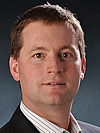 Roger A. Pielke, Jr. |
2012 GSA Public Service Award
Presented to Roger A. Pielke, Jr.
Citation by Daniel Sarewitz
The openness and integrity of science, and especially of the Earth sciences, have no stronger champion than Roger Pielke, Jr., recipient of the 2012 GSA Public Service Award. As the relations between science and politics have become more contested and complex, Roger’s work as a scholar and public intellectual stands out for its crystalline brilliance and fearless honesty. His book The Honest Broker changed the way that scientists and politicians can make sense of one another. His analyses of natural hazards and energy technology have opened pragmatic new pathways for climate change policy that lead away from the gridlock of the past twenty years. His thousands of blog posts, with their phenomenally broad readership, continue to galvanize democratic dialogue about the role of science in our world. I am privileged and humbled to have Roger as a colleague, and proud of GSA for recognizing his service to science and society.
 2012 GSA Public Service Award — Response by Roger A. Pielke, Jr.
2012 GSA Public Service Award — Response by Roger A. Pielke, Jr.
While in college in the late 1980s I worked as a student assistant doing FORTRAN programming for the Atmospheric Chemistry Division at the National Center for Atmospheric Research. There I was surrounded by world-leading scientists doing research related to stratospheric ozone depletion. I remember hearing these scientists observe that policy making would be much improved if only politicians had a better understanding of science.
That set me on a path in graduate school to learn a bit about policy making before, I then thought, returning to the physical sciences.
Along the way I had a chance to go to Washington, DC with Radford Byerly when he left a position at the University of Colorado to serve as chief of staff to Congressman George Brown, who had become chairman of the House Committee on Science and Technology. There I was surrounded by top science policy makers grappling with the early days of post-Cold War science policies.
One day after a long hearing on some complex issue, I distinctly remember sitting in a corner of Rad’s office while the top staff — including lawyers and PhD scientists — observe that policy making would be much improved if only scientists had a better understanding of politics. It was that very moment that set me on a course of scholarship and practice at the messy intersection of science and politics.
Today, many of our most contested policies involve an element of the scientific or technological, and often more than that. I am firmly of the belief that science and technology matters a great deal to our ability to make good decisions, and as a consequence, experts have an obligation to participate in the political process. At the same time, how experts engage in policy and politics can lead to better or worse outcomes. Consequently, the messy intersection of science and politics is not just a fascinating area of study, but one that has important contributions to make to real-world decision making.
I thank the GSA for this recognition, which of course reflects the collaboration and support of a great number of friends, colleagues and others.
